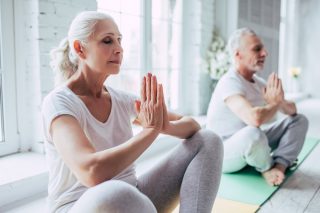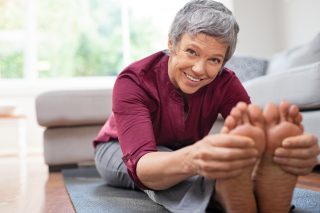In 2019, 9% of the world’s population was over the age of 65, and this percentage is expected to reach 16% by 2050.
Let’s explore the reasons behind this! Since the start of the 21st century, science and technology have advanced rapidly to make new treatment facilities, fitness equipment, and better nutrition options available for the public. As the internet has become accessible to everyone, people are now more aware of the factors which directly affect their health and try to incorporate healthy habits into their lives.
The availability of better facilities doesn’t mean that our seniors don’t require our attention. It’s our responsibility to keep a regular check on their health and advise them to alter their lifestyles to prevent illnesses and diseases.
What is Health?
Although the answer to this question seems obvious, there is a lot more to it. Health is defined as a state of complete social, mental, and physical wellbeing. If you have blood pressure issues, but you are physically and socially active, would you consider yourself healthy or unhealthy?
Well, illnesses and good health can coexist if the person manages his problems and continues to practice healthy habits.

4 PM production/Shutterstock
Physical Health
If all the organs and other essential parts of your body are functioning correctly, you are physically healthy.
When you develop a balanced diet and exercise regularly, your body maintains healthy levels of blood pressure and cholesterol keeps you at a lower risk of having a stroke and other diseases.
Keeping in mind the present situation of Covid-19, aged people and children should be more cautious as they are vulnerable to the disease than any other age group.
Mental Health
It refers to a person’s emotional wellbeing. Mental problems are difficult to diagnose because they are not visible in body scans and blood tests. People who have a positive attitude and pressure-handling skills are at a lower risk of having mental problems.
Did you know that mental and physical health are interconnected? Yes, a person might develop psychological problems due to an illness or a disease. You might have noticed that people who have had a stroke suffer from depression and anxiety.
Now, let me guide you through some of the ways in which the seniors can maintain a healthy state of mind and body.
Essential Lifestyle Health Tips for Senior Citizens
Becoming old is a reality of life that many of us fear to even think about. Aging is accompanied by different illnesses for which you might have to take several medicines in a day. So why don’t we think about preventing illnesses? Sounds illogical!
Stay Active
As you become older, your muscles and bones become weak, which can make walking a few steps seem like climbing a mountain. Physical inactivity also contributes to bone density loss and weakness, so I would advise you to spare 30 minutes for low-intensity physical activities like stretching and walking.
If you can’t take part in outdoor activities, don’t get demotivated! Household chores like carpet cleaning and doing the laundry also serve the same purpose.
Go for Full-body Checkups

Rido/Shutterstock
Vision loss, diabetes, and high blood pressure are some of the common problems associated with aging. Make sure that you are frequently visiting your doctor for full-body scans and reporting any changes that you feel in your body.
Get Adequate Sleep
Sleep is important for people of all ages, but for seniors, it’s a big health booster. Your body undergoes a lot of exertion during the day, so all the cognitive and physical damage is repaired while you sleep. Sleeping for 6-8 hours daily will also improve your memory and concentration.
Prevent External Damage to Your Body
Prevention is better than treatment! Aged people must be careful in choosing their everyday activities. Some activities like hiking, skiing, and even running might damage your body as your bone, and muscle strength decreases with age.
Eat a Balanced Diet
This phrase, “You are what you eat,” should define every individual’s diet. Try to include proteins, vegetables, and low-fat dairy products in your diet to meet the body’s daily requirement of nutrients. You should avoid eating processed and sugary foods to reduce your chances of becoming diabetic.
Keep a Check on Your Mental Health
Senior citizens spend most of their time at home, which can be detrimental to their mental health. Indoor activities, like chess, carom, and solving puzzles, can stimulate your brain activity and improve your analytical skills.
Socialize
After retirement, you might lose contact with your colleagues and friends. Your children and grandchildren are mostly busy with their jobs and studies, so they can’t sit down for a deep talk with you. You need to make new friends in your neighborhood and stay socially active.
Change Your Habits
Smoking and drinking can cause liver cancer and cardiovascular diseases, so now, it’s time to change your habits for your own good! Your immunity decreases with age, so be careful in choosing your lifestyle; your body can’t fight against all the garbage you feed into it.
Meditate
Meditation can help you reduce your stress levels and find a new purpose in life. It is also beneficial in raising self-awareness and healing any physical or mental damage.

fizkes/shutterstock
Stay Positive
After retirement, you might feel that your life has become static, but that’s not the case; you become free to discover new passions and interests. Some people might get depressed, but the key to happiness is to always stay positive and motivate others in a similar situation.
Final Thoughts
You are not alone! There are millions of people of your age around the globe. Aged people do require extra care, but who said that they couldn’t have fun? You must make a choice; either you can spend your whole life watching T.V., or you can go on holiday without worrying about going to the office the next day. Enjoy!





![women [longevity live]](https://longevitylive.com/wp-content/uploads/2020/01/photo-of-women-walking-down-the-street-1116984-100x100.jpg)











Have a hobby 🙂